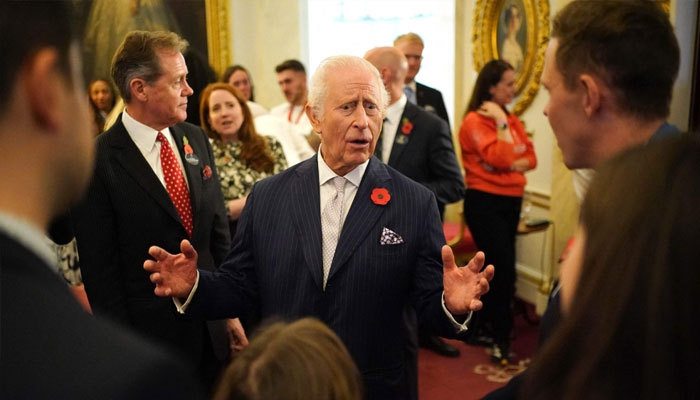Probe into UK royals private estates sparks calls for reform
UK media probe also accused estates of King Charles and Prince William of making big profits from charities
LONDON: Britain’s royal family is facing calls for more transparency and reform of their private estates after an investigation alleged they have been profiting from public bodies while benefiting from major tax exemptions.
The UK media probe also accused the estates of King Charles III and his eldest son Prince William of making big profits from charities and individual renters while in some cases failing to meet environmental standards. The centuries-old estates -- the Duchies of Lancaster and Cornwall -- have made millions of pounds (dollars) from lucrative deals with the publicly-funded National Health Service (NHS) and other cash-strapped ministries, according to the investigation.
Both estates -- portfolios of land, property and assets across England and Wales held in trust for the king and his heir -- are exempt from paying UK corporation or capital gains taxes. The extent of their holdings and commercial deals, such as lease agreements, is not publicly disclosed.
But the probe by UK television network Channel 4’s Dispatches programme and The Sunday Times claims to have uncovered them for the first time. It has prompted calls for a review by parliament as well as demands by pro-republicans for the duchies to be abolished.
Norman Baker, a former lawmaker from the centrist Liberal Democrats party and longtime royal critic, said the findings confirmed his view that the royals were “taking the public for a ride”. “These are Crown lands which belong to the public... all that money should be going into the Crown Estate, which is a public asset,” he said.
The royals have long maintained that profits from the duchies fund their public, charitable and private activities. The duchies, owned by the monarchy since the Middle Ages, were not part of a 1760 agreement which sees the monarch’s Crown Estate profits surrendered to the government. Fifteen percent of those profits are returned as a Sovereign Grant, which pays for official engagements, staff salaries and the royal palaces’ upkeep. Next year the grant will total £132 million ($171 million).
Baker notes the vast private estates were not included in that arrangement because at the time they did not generate much income.
But two centuries on, their assets are worth £1.8 billion, with profits topping £50 million in 2023, according to their annual reports.
It has helped keep Charles on The Sunday Times Rich List, which ranks the 1,000 wealthiest people or families in the UK, with an estimated worth of £610 million.
Lucrative deals leasing land to the crisis-hit NHS, armed forces, publicly-funded schools, charities and renters have boosted his bottom line, according to the media probe. In one example, Charles’ estate will earn nearly £12 million over 15 years storing a new fleet of electric ambulances owned by a London hospital in one of its warehouses.
In another, William’s estate will net £37.5 million over 25 years from the Ministry of Justice for leasing the currently empty Dartmoor Prison.
-
 JoJo Siwa Shares Inspiring Words With Young Changemakers
JoJo Siwa Shares Inspiring Words With Young Changemakers -
 James Van Der Beek Loved Ones Breaks Silence After Fundraiser Hits $2.2M
James Van Der Beek Loved Ones Breaks Silence After Fundraiser Hits $2.2M -
 Disney’s $336m 'Snow White' Remake Ends With $170m Box Office Loss: Report
Disney’s $336m 'Snow White' Remake Ends With $170m Box Office Loss: Report -
 Travis Kelce's Mom Donna Kelce Breaks Silence On His Retirement Plans
Travis Kelce's Mom Donna Kelce Breaks Silence On His Retirement Plans -
 Premiere Date Of 'Spider-Noir' Featuring Nicolas Cage Announced
Premiere Date Of 'Spider-Noir' Featuring Nicolas Cage Announced -
 Pedro Pascal's Sister Reveals His Reaction To Her 'The Beauty' Role
Pedro Pascal's Sister Reveals His Reaction To Her 'The Beauty' Role -
 Kate Middleton Proves She's True 'children's Princess' With THIS Move
Kate Middleton Proves She's True 'children's Princess' With THIS Move -
 Paul Anka Reveals How He Raised Son Ethan Differently From His Daughters
Paul Anka Reveals How He Raised Son Ethan Differently From His Daughters -
 'A Very Special Visitor' Meets Queen Camilla At Clarence House
'A Very Special Visitor' Meets Queen Camilla At Clarence House -
 Jodie Turner Smith Shares One Strict Rule She Follows As A Mom
Jodie Turner Smith Shares One Strict Rule She Follows As A Mom -
 Hailey Bieber Reveals KEY To Balancing Motherhood With Career
Hailey Bieber Reveals KEY To Balancing Motherhood With Career -
 Photo Of Jay-Z, Other Prominent Figures With Jeffrey Epstein Proven To Be Fake
Photo Of Jay-Z, Other Prominent Figures With Jeffrey Epstein Proven To Be Fake -
 Hillary Clinton's Munich Train Video Sparks Conspiracy Theories
Hillary Clinton's Munich Train Video Sparks Conspiracy Theories -
 Fans Slam Talk Show Host For 'cringe' Behavior In Chris Hemsworth Interview
Fans Slam Talk Show Host For 'cringe' Behavior In Chris Hemsworth Interview -
 Woman Jailed Over False 'crime In Space' Claim Against NASA Astronaut
Woman Jailed Over False 'crime In Space' Claim Against NASA Astronaut -
 James Van Der Beek’s Close Pal Reveals Family's Dire Need Of Donations
James Van Der Beek’s Close Pal Reveals Family's Dire Need Of Donations




